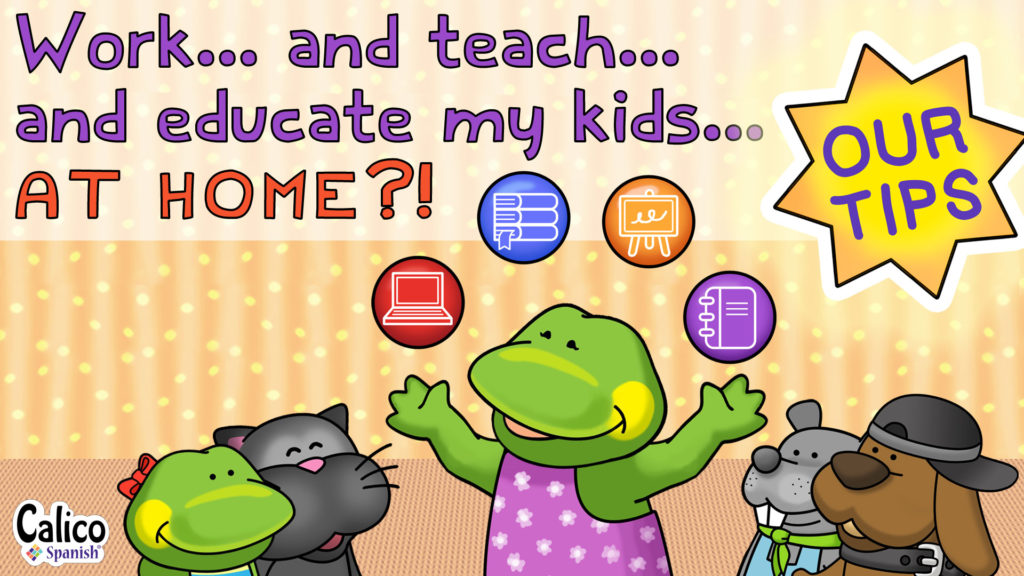Teaching (working? school?) from home?! Our tips.
– Like Calico Spanish on Facebook –

Teaching from home requires routine- and that’s impossible.
Here’s the great catch-22 of teaching from home, working from home, and educating your kids at home: Routine is king. But real routine is impossible.
I do know a few homeschool moms who seem to have this “set a routine and stick to it” thing completely down. They know who’s doing what and when, and what’s for dinner, and they make that happen. But without exception, these very few moms aren’t handling more than one of these time-consuming jobs at home. Their (quite worthwhile) full-time job is educating their kids and caring for their home. This is not our story. We are moms who are partnering with husbands to raise a family, educating our own children, and working at least one part-time job at the same time – often two or three. Sometimes it’s an economic question but often it’s just that the work we do brings fulfillment we want to have, and we choose not to give up our creative work on the side to focus solely on our children and home. Result: that all-important routine is so elusive.
Introduce a child you love to a lifelong journey of speaking real Spanish to real people. Click the red button to experience it FREE.
With all this experience behind us, we have to admit the social media photographs of ambitious school/work routines make us smile. Perhaps we laugh just a little bit. We’ll echo the sentiment that trying for a routine is going to make you much more productive – but get ready to cut yourself some slack, and read our tips.
When are the quiet times?
First, if you have a lot of noise and distractions from kids (or any other source) at home, ask: When is this noise at its lowest level? Working at home, for many people, happens best in the quiet stretches, before children wake up in the morning, or during afternoon naps (or for older children, required “rest” or “quiet time”). That worked for Erica, but Sara-Elizabeth struggles with chronic-illness related fatigue and so late-night work and early-morning work that used to be possible just aren’t anymore. This makes her turn to other strategies.

Try setting a timer for 15-30 minutes of work focused on one task.
Schedule brief sprints, and make the most of them.
As the author of A Gentleman in Moscow writes, what good is an intention without a plan? If long stretches of quiet work aren’t in the plans for you, you’ve got to plan for sprints instead. Use noise-canceling headphones or another method to block out chaos for 10-15 minute intervals. Set a timer, even for just 15 minutes, and stick to it. Refuse to turn from a single task for that segment of time. Try using a visual system for your family: a red sign of some kind means do not disturb. Perhaps orange means, “I’m busy, but you can ask questions about your schoolwork.” Green could mean, “I’m all yours.”
– Follow Calico Spanish on Twitter –
What can distract your distractions at home?
If children are your major distraction in the moments you’re trying to work, you can also think of what could distract them from needing your attention for a few much-needed minutes. This doesn’t always have to mean screen time, either. Could they listen to an audiobook (try Kindle Fire Kids with Amazon FreeTime). What about building with Legos? Building their own zoo in the basement, complete with habitat setup, a gift shop, and concessions? Give them a scavenger hunt list of nature items for the backyard, or have them draw an obstacle course for other kids on the sidewalk in front of your house. Also, in these moments, know that often it’s low-quality work you’ll be able to get done at this time, so pay bills, answer a few emails, organize your papers, and so on.

Turn off notifications and if you can, silence your phone.
If your distractions are digital, you’ll need self-control and a few different strategies. Consider turning off notifications on your phone, or just put it on “do not disturb” if you don’t need to receive calls. On your browser, close everything but the tabs you want to be working on. As you close several, you can open more. Schedule yourself a time when you’ll open your email. Emails are rarely urgent; no one’s going to suffer from waiting on you a while for an email response. Also in your browser, disable pop-up notifications- you know how to find out about tweet replies and news briefings without getting constantly distracted by notifications about them.
Working from home is better in the right environment.
There is no “right” work environment for everyone working and teaching from home. Still, you can take some steps to improve your productivity by improving your environment. Is there a particular place you can set up your home office? What can you do to reproduce your usual work environment there- play the same music? Order a similar desk and/or chair? One of our team has put a birdfeeder in front of the home office window since the stay-at-home orders began, and the prospect of watching the birds visit throughout the day brings joy to the act of sitting down at the desk to work at home.
School at home is not school at school.
If you’re suddenly educating your children at home while trying to work from home, you should know this: every newbie homeschooler is shocked at how quickly the “schoolwork” is done. So many parents ask this question on Facebook groups – the state mandates X number of hours but my kids are done in 2! What am I doing wrong? NOTHING, very likely. Seasoned homeschoolers will tell you that this is happening because of all the things your kids don’t need to do. They don’t have to line up or take scheduled bathroom breaks. In a 7-hour school day, lunch happens. Bathroom visits happen. Recess happens. Free time happens. Reading time happens. Parents teaching their kids at home quickly realize that school at home isn’t the same as school at school. Also, understand that outdoor play is school. Helping with dinner is school. Learning to navigate difficult relationships is learning!

Don’t discount the value of more time – and dinner – together.
Also, for those of this with young children, we are in a particularly precious and messy stage. This is our reality, but it isn’t everyone’s. For those of us with young children, they need our attention and often need to be our #1 priority, and that’s okay. It won’t always be that way. They also need to learn limits and patience and what an interruption is. There is a balance and it is constantly shifting. Getting anything done is a miracle. Celebrate the victories.
– Follow us on Instagram too! –
So what if we get to the other side of this and our kids aren’t any better at addition but they’re more empathetic towards parents, siblings, and the sick? What if they can work more independently, and they’ve had umpteen meals with mom and/or dad at the table with them, and they figured out how to stack the dishwasher – or better, to wash the dishes by hand? If they walked the dog and climbed a tree, drew a rainbow for the front door. If they laughed so hard at the family movie that milk came out their nose, and then they cleaned it up. If they learned that running out for a new toy was not necessary, if they realized how utterly insufficient TikTok is to support real relationships, if they sorely, deeply, intensely miss in-person contact – if these things are true, and they very well could be, this crisis will have some serious silver linings.
Realistic expectations for them
If you’re realizing all of the above as you work with your own children and their distance learning, it’s likely you’ve also realized you need to extend this gracious level of expectation to your learners at their home, as well. Recently the #earlylang chat on Twitter has been focused on brainstorming ideas for helping kids learn at home while maintaining sanity and realistic expectations – and most importantly, supporting kids’ and families’ emotional health, too. You’ll find a lot of tips by searching that hashtag on Twitter. Also, the organization that sponsors the chat, the amazing National Network for Early Language Learning (NNELL) has a spreadsheet full of helpful links for language teachers in this challenging moment in our time.
Success in teaching and learning home = attitude.
Finally, let’s do an attitude check. Let’s not measure our success during this time by how much we’ve accomplished, either, at least not according to what we used to describe as accomplishment. For the sake of all your friends slugging through this, do not post pictures of the amazing color wheel you and your kindergartener put together – at least not without also posting pictures of the macaroni mess that the art project turned into. The reality is that we don’t have it all together, and flooding our Instagram with the lie that we do hurts everyone else.
Instead, set yourself up for a sense of realistic accomplishment. At the beginning of the day, set two or three “Must Do” items to feel you’ve accomplished something. Perhaps it’s a 7-minute workout, answering a parent email, braving the grocery store to replenish the milk. Perhaps you have a bigger task: planning your at-home assignments for next week to post by 4 p.m. You know accomplishing that today will free up tomorrow, so push everything else aside – your kids can catch up tomorrow. The milk will be there tomorrow (the toilet paper, probably not). Do this one thing and know that you are a rockstar who actually met goals today!
Know that whatever systems you implement, visual cues for kids or timers or whatever, will work for a limited time. Then, you’ll have to re-invent, replace, and/or restructure. Stay creative and be willing to give something up.
More help for all of us at home
Digital Elementary Spanish Lessons
for a 39-page PDF of 10 days of lesson plans, discounted membership, and more!






2 Comments
It’s so encouraging that you two are homeschooling moms! I’ve been homeschooling up in Ontario, Canada for the last 4 years and just bought Calico a week ago…I was just looking around on your blog and was surprised (I guess maybe not!) to find out that you’re homeschoolers too! That excites me even more for the program to know that the format also has homeschooling parents in mind. I’m really looking forward to teaching it!
Sarah
We’re thrilled to have you as part of the Calico tribe – we love serving homeschool families!